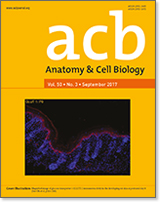 An anatomy journal has banned a researcher from submitting papers for three years after determining one of his recently published papers suffered from “serious ethical” issues.
An anatomy journal has banned a researcher from submitting papers for three years after determining one of his recently published papers suffered from “serious ethical” issues.
According to Jae Seung Kang, associate editor at the journal Anatomy and Cell Biology (ACB), the paper’s sole author—Jae Chul Lee—falsified both his affiliation and approval for conducting animal experiments in the paper, published online in March.
Kang said the journal discovered the issues after Lee submitted other papers to the journal this past August. During the journal’s review process, it discovered “over 70% redundancy”—ie, plagiarism—between the newly submitted papers and two now-retracted papers—the ACB paper as well as a 2015 paper published in the Journal of Pathology and Translational Medicine, on which Jae Chul Lee was corresponding author. The issues prompted the journal to conduct “an in-depth investigation,” Kang said.
In the ACB paper, Lee lists his affiliations as Seoul National University Bundang Hospital in Seongnam and Seoul National University College of Medicine. As Kang explained, Lee had completed his doctorate at Seoul National University College of Medicine in 2014, but now works as a senior researcher at Seoul National University Bundang Hospital:
Seoul National University College of Medicine never hired Jae Chul Lee or gave any title … However, in all his papers, Jae Chul Lee is still described as a staff member of Seoul National University College of Medicine. In this regard, Seoul National University College of Medicine officially requested that Jae Chul Lee be not affiliated with Seoul National University College of Medicine…
The paper describes research about hypertension in rats, not humans—yet Lee provided an Institutional Review Board (IRB) number for the approval of the animal experiments, which is typically required for work in humans. There was another problem, said Kang: The IRB number Lee provided was wrong—it was a duplication of an Institutional Animal Care and Use Committee (IACUC) number that approved other research not included in this paper.
When the ACB editorial committee asked Lee for an explanation, Lee “requested the withdrawal of the paper along with [his] apology,” Kang said.
We reached out to Lee, who told us that he had provided the journal with an explanation for the research approval number he had used in the article and said he plans to resubmit his paper to another journal. We also asked Lee for further insights about the other alleged infractions listed by the journal, but he did not respond. (His email listed his affiliation as the Department of Anatomy at the Seoul National University College of Medicine.)
Kang added that the journal had contacted the editor of the Journal of Pathology and Translational Medicine, which retracted Lee’s 2015 paper, and found the reason for the retraction “was very similar to our case.”
The notice for “Therapeutic Effects of Umbilical Cord Blood Derived Mesenchymal Stem Cell-Conditioned Medium on Pulmonary Arterial Hypertension in Rats,” which was retracted in July 2016, states that “several issues related to the authorship, research materials, and protocols have been raised.” It notes the first author, Lee, has “admitted that he is mainly responsible for the misconduct.”
The retraction notice for ACB’s “Therapeutic effect of prostaglandin E1 in monocrotaline-induced pulmonary arterial hypertension rats” describes the findings of the journal’s investigation:
The article [1] has been retracted at the request of the editor and author due to the following reasons: Research Ethics Committee of the Korean Association of Anatomists confirmed (1) the author submitted the false information about the author’s affiliation and (2) the author duplicated the Institutional Review Board (IRB) number. The author apologizes to the readers.
The 2017 paper, which was retracted in September, has not yet been indexed by Clarivate Analytics’ Web of Science, which we typically use to determine how often a paper has been cited.
Journals don’t frequently ban authors from submitting papers, but it does happen.
Hat tip: Rolf Degen
Like Retraction Watch? Consider making a tax-deductible contribution to support our growth. You can also follow us on Twitter, like us on Facebook, add us to your RSS reader, sign up on our homepage for an email every time there’s a new post, or subscribe to our daily digest. Click here to review our Comments Policy. For a sneak peek at what we’re working on, click here. If you have comments or feedback, you can reach us at [email protected].